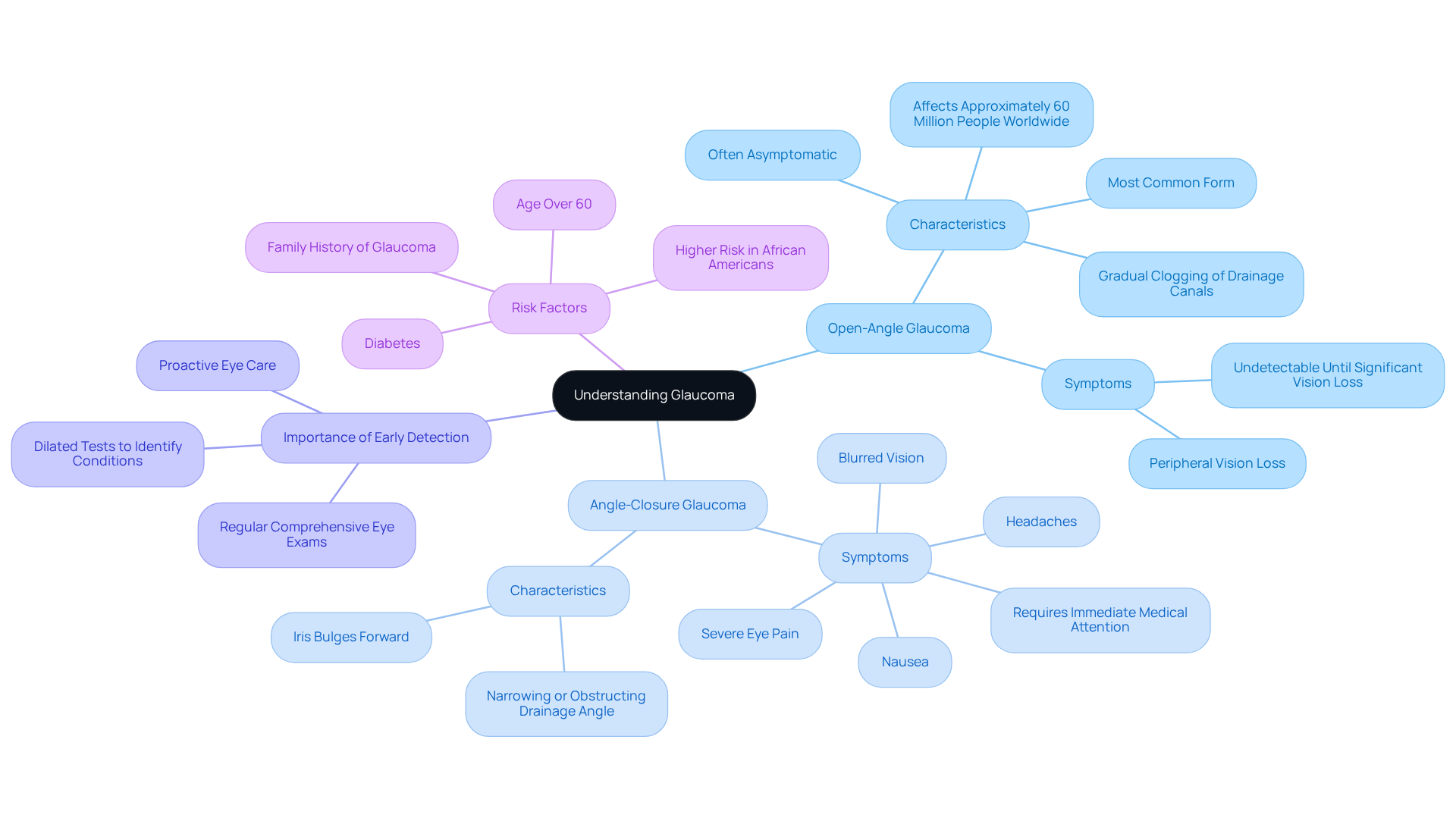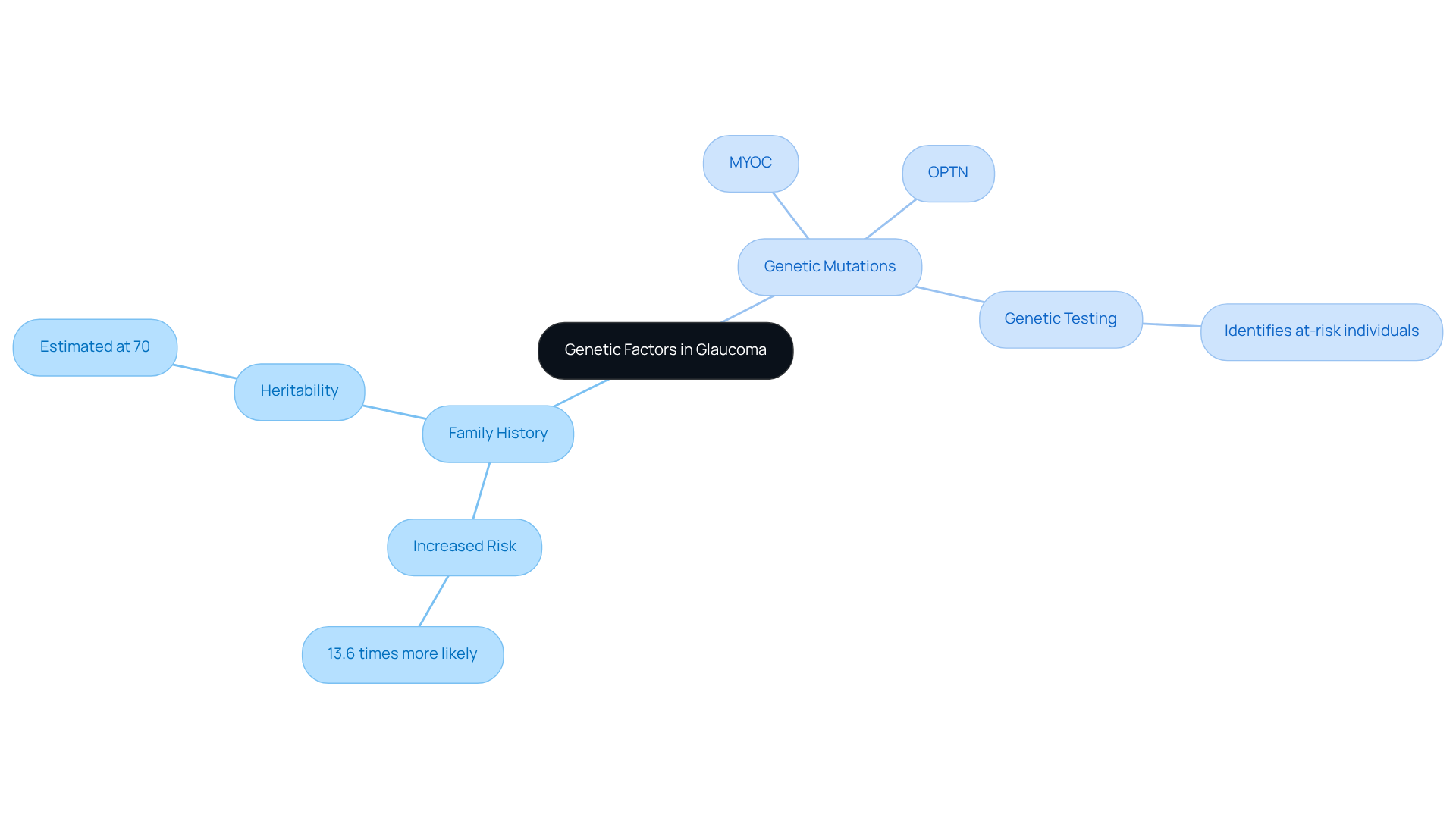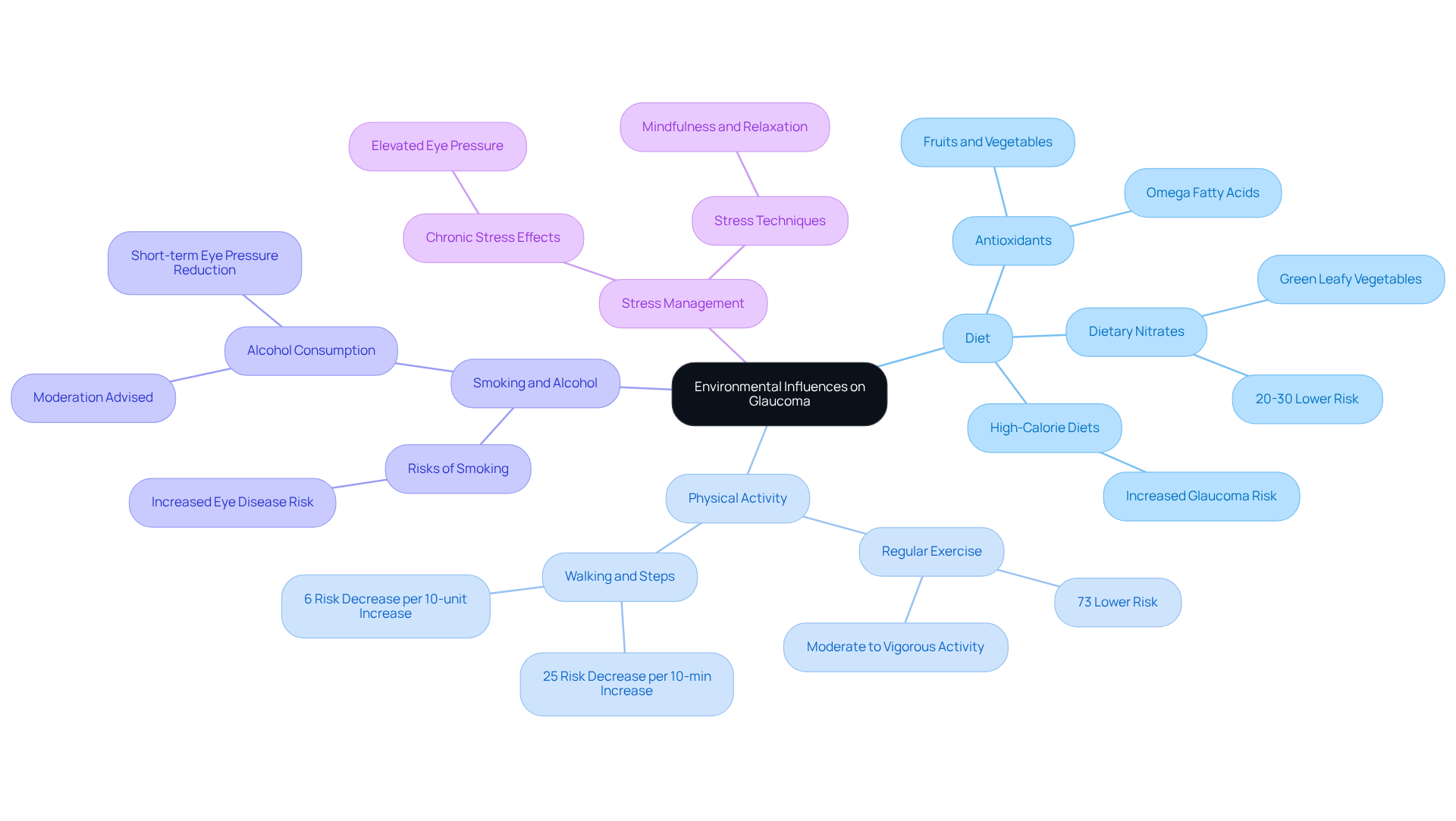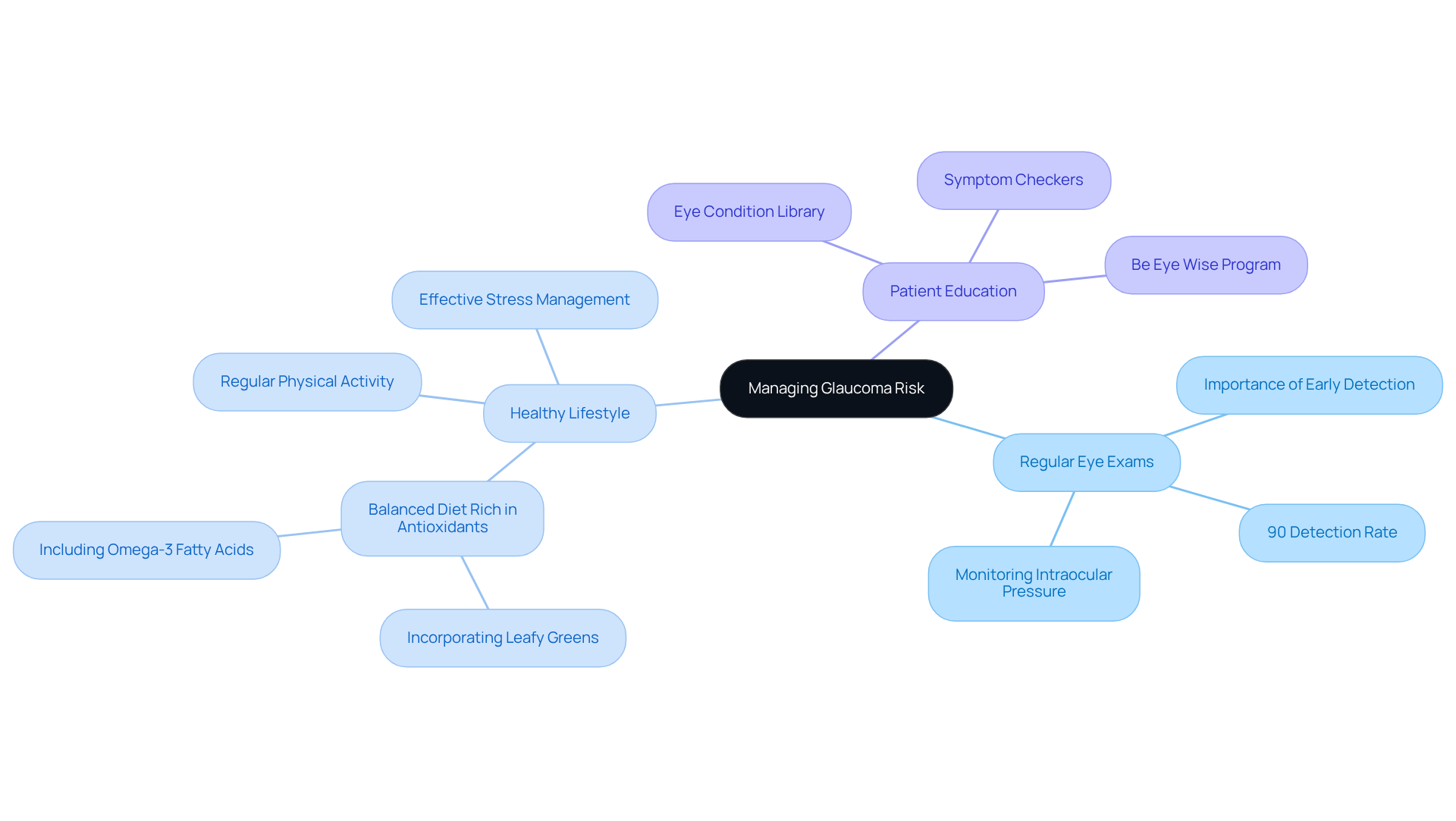Posted by: Northwest Eye in General on July 13, 2025
Overview
Glaucoma is indeed a hereditary condition, and we understand that this may raise concerns for you. Individuals with a family history of glaucoma face a significantly heightened risk, with first-degree relatives being 13.6 times more likely to develop it. This information can be unsettling, but it’s important to know that you are not alone in this journey.
The article highlights that glaucoma has an estimated heritability of 70%. It also identifies specific genetic mutations linked to the disease, underscoring the importance of genetic factors alongside environmental influences in its development. We are here to help you understand these factors and support you in navigating your health.
If you have a family history of glaucoma, we encourage you to discuss this with your healthcare provider. Together, you can explore options for monitoring and managing your eye health effectively.
Introduction
The intricate relationship between genetics and environmental factors plays a crucial role in understanding glaucoma, a condition that silently threatens the vision of millions. We understand that discovering hereditary aspects of this eye disease can lead to heightened anxiety for those with a family history. It’s common to feel overwhelmed by the complexities of genetic predisposition and lifestyle choices.
How can one effectively navigate these challenges to manage this condition and safeguard their sight? We are here to help you through this process.
Understanding Glaucoma: Types and Symptoms
Glaucoma encompasses a range of eye conditions that can cause damage to the optic nerve, primarily due to elevated intraocular pressure. We understand that learning about this condition can be concerning, so let’s explore the two predominant types of glaucoma together:
- Open-Angle Glaucoma: This is the most common form, characterized by a gradual clogging of the eye’s drainage canals. Often, symptoms remain undetectable until significant vision loss has occurred. Approximately 60 million people worldwide are affected by this condition, and many may be unaware of their diagnosis due to the absence of early symptoms.
- Angle-Closure Glaucoma: This type occurs when the iris bulges forward, narrowing or obstructing the drainage angle formed by the cornea and iris. Symptoms can manifest suddenly and may include severe eye pain, headaches, nausea, and blurred vision. This acute presentation requires immediate medical attention to prevent irreversible vision loss.
Comprehending these varieties and their related symptoms is essential for early identification and effective management, particularly for those who wonder if glaucoma is hereditary. At Northwest Eye, we are here to empower you through knowledge. We encourage regular comprehensive eye exams, including dilated tests, to identify these conditions before significant damage occurs. As part of our Be Eye Wise initiative, we emphasize that the only reliable way to detect eye conditions early is through thorough examinations, highlighting the importance of proactive eye care.
“Great place. The doctors and staff were extremely patient with our very active 15-month-old daughter.” – Lydea L
“All of the staff at Northwest Eye are friendly and get your needs taken care of in the best of ways. A visit to any of the clinics is a great experience.” – Perry H
Additionally, certain demographics, such as African Americans, are at a higher risk for developing glaucoma, making awareness and education even more vital. We invite you to learn more about your eye health and schedule an appointment with our dedicated team of doctors at Northwest Eye by visiting our website.

Genetic Factors in Glaucoma: Heredity and Risk Assessment
Studies suggest a significant hereditary aspect in the condition, highlighting the necessity of comprehending genetic elements. We understand that this can be a concerning topic for many, and it’s important to feel informed and supported. Key elements include:
- Family History: Individuals with a family history of glaucoma face a significantly heightened risk. Research shows that first-degree relatives of individuals with the eye condition are 13.6 times more likely to develop the ailment compared to those without such a background. Additionally, this eye condition has an estimated heritability of 70%, emphasizing the genetic influence on the disease.
- Genetic Mutations: Specific genes, including MYOC and OPTN, have been linked to this eye condition. Recent research has identified that mutations in these genes can contribute to the development of the disease, with genetic testing serving as a valuable tool for identifying at-risk individuals. This proactive approach allows for timely monitoring and management, which is crucial for preserving vision.
Comprehending these genetic elements is essential for individuals with a familial background of eye disease. We encourage regular eye check-ups and prompt action to reduce the likelihood of vision loss. Remember, you are not alone in this journey, and we are here to help you through the process.

Environmental Influences on Glaucoma: Lifestyle and Risk Factors
Environmental factors and lifestyle choices significantly influence the development and progression of eye conditions. We understand that navigating this information can feel overwhelming, but knowing how to take care of your eyes can empower you. Here are some key influences to consider:
- Diet: A diet rich in fruits and vegetables, especially those high in antioxidants, may lower the risk of glaucoma. Nourishing your body with the right foods is a positive step.
- Physical Activity: Regular exercise can help maintain healthy eye pressure and overall eye health. It’s common to feel unsure about starting a new routine, but even small changes can make a difference.
- Smoking and Alcohol: Both smoking and excessive alcohol intake have been associated with a heightened chance of eye disease. If you’re looking to make changes, know that support is available.
- Stress Management: Chronic stress may contribute to elevated eye pressure, making stress management techniques beneficial. Remember, taking time for yourself is not just okay—it’s essential.
By comprehending these ecological factors, you can make informed lifestyle decisions that may lessen your chance of developing eye conditions. We are here to help you through this process, and together, we can work towards healthier eyes.

Managing Glaucoma Risk: The Role of Regular Eye Exams and Lifestyle Choices
Handling the threat of eye conditions requires a proactive approach that combines routine eye check-ups with healthy lifestyle choices. We understand that prioritizing your eye health can feel overwhelming, but we are here to support you every step of the way. Key strategies to consider include:
- Regular Eye Exams: Comprehensive eye exams are vital for early detection, especially for those at higher risk. At Northwest Eye, our compassionate eye care professionals monitor intraocular pressure and evaluate the health of your optic nerve using advanced diagnostic tools. This ensures that if any issues arise, we can intervene promptly. Approximately 90% of cases of this eye condition can be detected through routine eye exams, highlighting their critical role. Furthermore, about 90% of patients who receive appropriate treatment for eye pressure issues can maintain functional vision throughout their lives, reinforcing the importance of early detection and consistent follow-up.
- Adopting a Healthy Lifestyle: We recognize that making healthy choices can significantly impact your overall eye health. A balanced diet rich in antioxidants, regular physical activity, and effective stress management techniques are essential. Simple adjustments, such as incorporating leafy greens and omega-3 fatty acids into your meals, can yield positive results for individuals susceptible to eye conditions. This demonstrates how holistic health plays a crucial role in preserving your vision.
- Patient Education: Empowering you with knowledge about the signs and symptoms of eye conditions is essential. At Northwest Eye, we provide valuable educational resources, including our Eye Condition Library and symptom checkers, to help you better understand your health. This initiative, part of our Be Eye Wise program, encourages you to seek timely medical attention, which is vital for preserving your vision and preventing irreversible damage.
To learn more about our specialized eye care services or to schedule an appointment, please visit Northwest Eye’s website or reach out to us directly. By integrating these strategies, you can effectively manage your glaucoma risk and consider whether glaucoma is hereditary while maintaining your eye health. Remember, we are here to help you through this process.

Conclusion
Understanding the hereditary and environmental factors that contribute to glaucoma is essential for effective management and prevention of this sight-threatening condition. We understand that the interplay between genetics and lifestyle choices can be overwhelming, which underscores the importance of being proactive about eye health. With a significant hereditary component, individuals with a family history of glaucoma are at a much higher risk. This reinforces the need for regular eye examinations and awareness of the symptoms associated with this condition.
Key insights from the article highlight the importance of routine eye check-ups, which can detect approximately 90% of glaucoma cases early, allowing for timely intervention. It’s common to feel uncertain, but knowing that lifestyle factors such as diet, physical activity, and stress management play a crucial role in minimizing the risk of developing glaucoma can be reassuring. By understanding the types of glaucoma and their symptoms, you can better advocate for your eye health and seek appropriate care when necessary.
Ultimately, navigating the complexities of glaucoma requires a combination of genetic awareness and lifestyle adjustments. Empowerment through education and regular eye care can significantly impact long-term vision preservation. Taking proactive steps today—such as scheduling eye exams and adopting healthier habits—can lead to a brighter future for your eye health. Remember, we are here to help you through this process.
Frequently Asked Questions
What is glaucoma?
Glaucoma is a range of eye conditions that can damage the optic nerve, primarily due to elevated intraocular pressure.
What are the two main types of glaucoma?
The two main types of glaucoma are Open-Angle Glaucoma and Angle-Closure Glaucoma.
What is Open-Angle Glaucoma?
Open-Angle Glaucoma is the most common form, characterized by a gradual clogging of the eye’s drainage canals. Symptoms often remain undetectable until significant vision loss has occurred.
How prevalent is Open-Angle Glaucoma?
Approximately 60 million people worldwide are affected by Open-Angle Glaucoma, and many may be unaware of their diagnosis due to the absence of early symptoms.
What is Angle-Closure Glaucoma?
Angle-Closure Glaucoma occurs when the iris bulges forward, narrowing or obstructing the drainage angle formed by the cornea and iris. Symptoms can manifest suddenly and may include severe eye pain, headaches, nausea, and blurred vision.
What should one do if they experience symptoms of Angle-Closure Glaucoma?
If symptoms of Angle-Closure Glaucoma occur, immediate medical attention is required to prevent irreversible vision loss.
Is glaucoma hereditary?
Yes, understanding the types of glaucoma and their symptoms is essential for early identification and effective management, particularly for those concerned about hereditary factors.
How can glaucoma be detected early?
Regular comprehensive eye exams, including dilated tests, are crucial for early detection of glaucoma and other eye conditions.
Who is at a higher risk for developing glaucoma?
Certain demographics, such as African Americans, are at a higher risk for developing glaucoma, making awareness and education even more vital.
How can I learn more about my eye health or schedule an appointment?
You can learn more about your eye health and schedule an appointment with the dedicated team of doctors at Northwest Eye by visiting their website.






